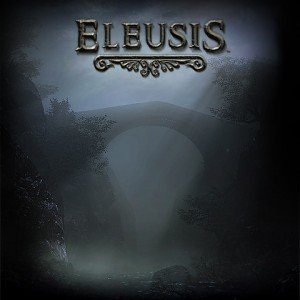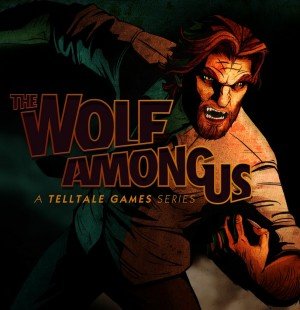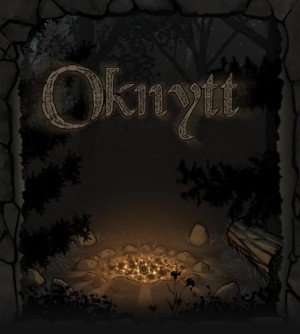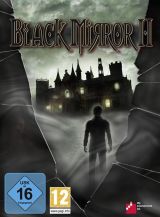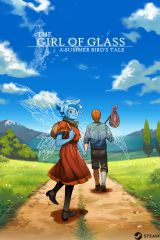Review for The Inheritance

Scott Adams is a name familiar to many text adventure fans. Inspired by the iconic mainframe game Adventure, he founded the company Adventure International in 1978. They're perhaps most well-known for creating Adventureland, the first ever commercial adventure game. For some, Adams’ games are remembered fondly as being technically innovative with a humorous charm, but for others, they have little worth beyond the fact that they came first. Sadly, twenty-five years later The Inheritance for the most part confirms the latter opinion: it does have one or two redeeming factors, especially in terms of puzzle ideas, but the overall package is so littered with flaws and inadequacies that the game is rendered underwhelming and, at worst, unenjoyable.
The Inheritance opens awkwardly, with the off-stage character Butler Jeeves – painfully voice-acted and achingly clichéd – welcoming you to “Scott Adams' Bible Adventure Number One”. Following this, you're given the vague outline of the story, which roughly falls into the old-school treasure hunt template. Except in this case there is only one treasure: a first edition Gutenberg Bible that a deceased man has bequeathed to us – that is, if we can find it. He has made it such that the book is extremely difficult to obtain, requiring a full comprehension of the meaning of certain biblical passages in order to finally acquire it. You control an essentially empty avatar – self-mockingly called Avie the Avatar – who is found, for reasons left unexplained, in charge of this tricky task. The use of religious themes to solve this task is where the game tries to distinguish itself, but apart from that it's just your traditional text adventure, with heavy puzzle solving and a plethora of locked doors.
If you're at all concerned that the game's religious themes are of the shove-down-your-threat variety, you needn't worry. At times I didn't even notice, or at least forgot, about the religious aspect. At one point, for example, you spend in excess of an hour unlocking yet another door, shooting at a model landscape and jumping across a chasm – all puzzles void of any religious content – then afterwards you suddenly find yourself sifting through bible passages about 'God's Plan'. Much of the game's traditional puzzle content is similarly distinct from the religious content. And when you do eventually have to read bible passages, they feel more like riddles than biblical text. Because of this, the religious element isn't there to preach so much as to facilitate many of the game's puzzles.
You go about solving these puzzles by making use of a fully implemented King James Bible. There's no getting around it, you will have to use the bible to overcome a good number of obstacles, but what you do have to read is rarely too long or preachy to impede the gameplay. However, as the bible was implemented in its entirety, I found more fun in looking up some of the infamously amusing – but wholly irrelevant – passages (the strangely lascivious Ezekiel 23:20 springs to mind). This can all be done quite conveniently with the command >rb [bible passage] – which, considering the number of passages mentioned throughout the game, is a remarkably helpful inclusion.
The Inheritance's prose is probably its weakest aspect. Integral to a text adventure is the quality of the writing, so for the game to suffer in this regard is indeed troubling. The general tone is often very simplistic and childlike, consisting of lines like “you seem to be taking one of the 10 commandments a bit lightly! I know Mr Fogborne would not have approved!” The prose usually adopts this bland yet excitable style, using a generous number of exclamation marks along the way. Ultimately, I found it extremely dull to read, and, at times, just plain annoying. On one occasion the colloquialism of the prose reaches an intolerable extreme: “Well don't give up, who knows what the future will bring? ![]() ” Adams actually included a smiley, which makes it read more like a Facebook message than a text adventure from an industry legend.
” Adams actually included a smiley, which makes it read more like a Facebook message than a text adventure from an industry legend.
The writing is also full of various mistakes that, considering the many listed testers, really shouldn't still be there. Commas and full stops are nearly always in the right place, but it's not uncommon for capital letters to be misplaced, or for words to be misspelt, or even for tenses to be muddled. Sometimes these are so obvious (“I am havng...” “No that's not it either, Oh well you mumble...”) that it's hard to believe that the game ever got past beta testing.
Not all the prose is bad, however. Adams, like in his earlier works, has written it all in first-person, as opposed to the far more commonplace second-person. At the very least this is an interesting choice, and although it doesn't really add much, it certainly works. Also, there are many jokes scattered throughout the game – they're hit and miss, but some of them give an interesting insight into Adams' personality and are genuinely funny. Unfortunately, some of the jokes, particularly one about how Adams has failed to implement a response, get repeated word-for-word throughout the game, which wears quite quickly.
But The Inheritance's writing isn't there to tell a great story; the story is only really there to provide context to the gameplay. This isn't necessarily a problem for a game with compelling gameplay, but unfortunately the gameplay here is often far from inspired. Some of the puzzles are actually quite clever, and their inclusion means that parts of the game can be fun and rewarding. They come in all shapes and sizes, though inventory puzzles mostly dominate. Most are challenging, but by no means impossible, and when successful they do show hints at what could have been a great puzzle-fest. Sadly, however, these puzzles often fall short for a number of reasons.
One particularly frustrating solution sticks in my mind. The aim is simply to get to sleep – working out the solution itself isn't too hard, but the process of acting it out is incredibly tedious. One must quite literally type, by my count, fourteen commands. Part of the problem is that, unlike in most modern Interactive Fiction (IF), the game doesn't include many basic yet invaluable additions that improve playability. You can't type >leave motel, for example, without having to open the front door first. In most IF nowadays, when leaving a room the game will automatically understand you want to open the front door first – it's merely common sense. Any kind of container presents an even more unnecessary problem: to examine something inside. Early in the game, for instance, you encounter an umbrella within a wardrobe – you have to type the long-winded >x umbrella in the wardrobe as opposed to the succinct >x umbrella. Unfortunately, there are many more similar issues with the parser that, after a while, make playing the game fairly laborious. It is doubtless an improvement on the infamous two-word parser found in Adams’ earlier games, but it still feels less refined than even Infocom's early parser.
Puzzles can also be quite under-clued. A lot of this has to do with inadequate, and at times a lack of, helpful responses. There may be occasions where you try to perform an action, like taking an item, and the game will respond “I can't do that yet”, without any explanation as to why. When a game has no visuals, as is the case here, the text needs to be far more responsive and informative than it is here. Adams isn't dealing with sixteen-kilobyte limits anymore, so there really isn't any reason why more text couldn't have been included.
In terms of bad puzzle ideas, Adams couldn't have gone down a worse route, in my opinion. It seems that he thought no old-school text adventure is complete without a maze. So he included two. Both of these are extremely frustrating to map: for one, you have to overcome misleading compass readings, and for another, you have to navigate 'twisty passages all alike' in pitch-black darkness. Maybe there are one or two veteran adventurers out there for whom this brings forth warm nostalgia, but for me and doubtless many others, mazes are a dull and tedious relic of adventure gaming's past.
The problems with the puzzles are, to some extent, made less frustrating thanks to the built-in hint system. It is a multi-tiered system, with the final tier providing the full-blown solution, and it covers many of the puzzles to a varying degree of success. Through sheer unluckiness, the first time I needed to use the system I discovered that the hints for the puzzle I was stuck on hadn't actually been implemented. Thankfully, Adams himself supplied me with a clue – it was actually a really good, logical puzzle, to my embarrassment – but unfortunately, other problems with hints cropped up throughout the rest of the game. I won't lie, as much as I tried to abstain from using it, I found myself dipping into the hint system several times, though nearly always needing little more aid than the lowest tier provided. In doing so I uncovered other instances of unimplemented subjects, but perhaps more annoyingly I found that the hint system often lacks context – it sometimes mentions things you have yet to find, for example.
Other modern – well, post-1985 – inclusions also help, albeit only slightly, to soften the edges of the gameplay. Most notably, especially in comparison to Adams’ games with Adventure International, you cannot die nor reach a dead end. Because of this, Adams also made it so that only autosave is available, which may annoy some. Also, while wearing your special adventuring vest, there is no inventory limit (thank goodness). And perhaps the design choice I appreciated the most, the map is compact enough not to require mapping (except for those damned mazes). I understand that some people may actually want a larger map, but I felt that the choice to have a dense and easily navigable map was one of the game's few strengths.
Despite the map's limited size, The Inheritance is still quite long, especially compared to modern IF standards. Being a puzzle-fest at heart, the game is littered with devious puzzles that could force even the most expert of adventurers to spend several days concocting solutions. Personally, I spent more time thinking about puzzle solutions than actually playing the game, which is something I've seldom experienced in newer adventure games, and I did at times enjoy the challenge – although often the challenge merely derived from some of the game's inept cluing and less-than-stellar parser.
The game has a few interesting inclusions that are not common to text adventures. Firstly, it incorporates sound effects; these range from atmospheric effects to action-cued sounds to voice recordings. Some of the sounds, especially the relentless rain, grated on me quite quickly – though, thankfully, there is the option to turn them off. But I didn’t find the sound effects added anything anyway, especially considering they are also described in the prose.
Actually, I lie – the sound effects did add one thing: technical problems. Alongside many other pervasive technical issues, such as sentences occasionally printing twice, the sound effects present an equally annoying problem. Whenever a voice recording or an action-cued sound plays, the game screen will freeze, with Windows claiming that the application is not responding until the sound is over. It's because of both this technical problem and their redundancy that I can't advise playing with the sound effects on.
Another uncommon inclusion is the customisable layout. This has come to be expected in modern IF, especially in terms of customisable fonts, but The Inheritance actually goes one step further: you are able to choose where the player input and game output windows are placed, as well as choosing between two ways of displaying the prose. It's by no means revolutionary, but I do appreciate being allowed to personalise the interface (even though I just defaulted to the tried and tested “Input on Bottom – Output Classic”, as the game describes it). On the other hand, the colour of the interface, which you can't change, is quite bland: Windows-blue borders enclosing black text on a white background. It's not horrible to look at, but a slightly more adventurous design, or even just the sleek yet minimal design of most IF, would be very welcome indeed.
There is one thing I did indeed love about the game: the ending. When you solve the very last puzzle, a recorded message by Adams plays out, accompanied by a midi brass fanfare, warmly congratulating you on reaching the end. For a brief moment I forgot about all the game's flaws and instead just enjoyed the obvious enthusiasm and passion of the author. For this isn't a lazily put-together game, nor is it a worthless game. Effort has obviously gone into devising the puzzles, and there is passion buried beneath all its flaws. But the game can hardly be considered good either: the prose is weak, the gameplay is plagued with technical problems and the inclusion of two mazes is utterly egregious. Not even the endearing end message can make up for the fact that playing through The Inheritance just isn't an enjoyable experience.







